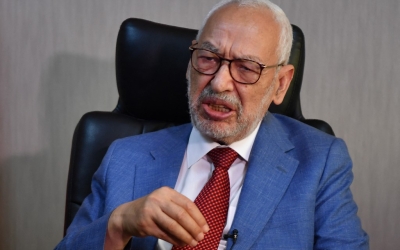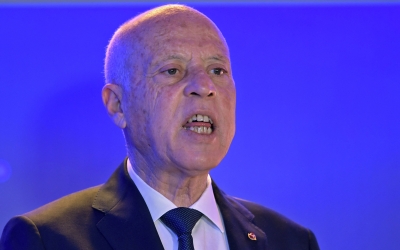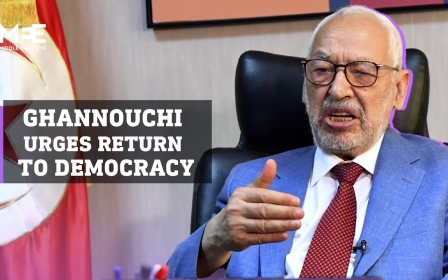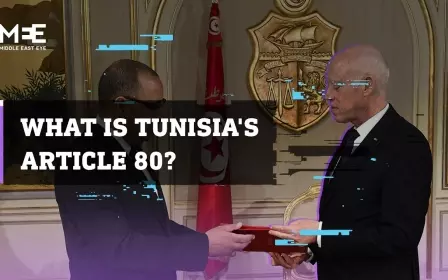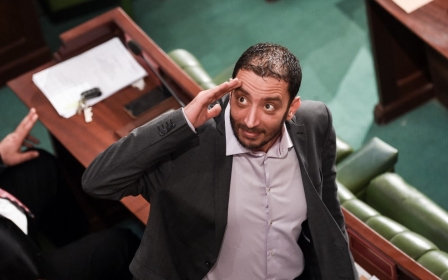Tunisians express cautious optimism and support for president following coup
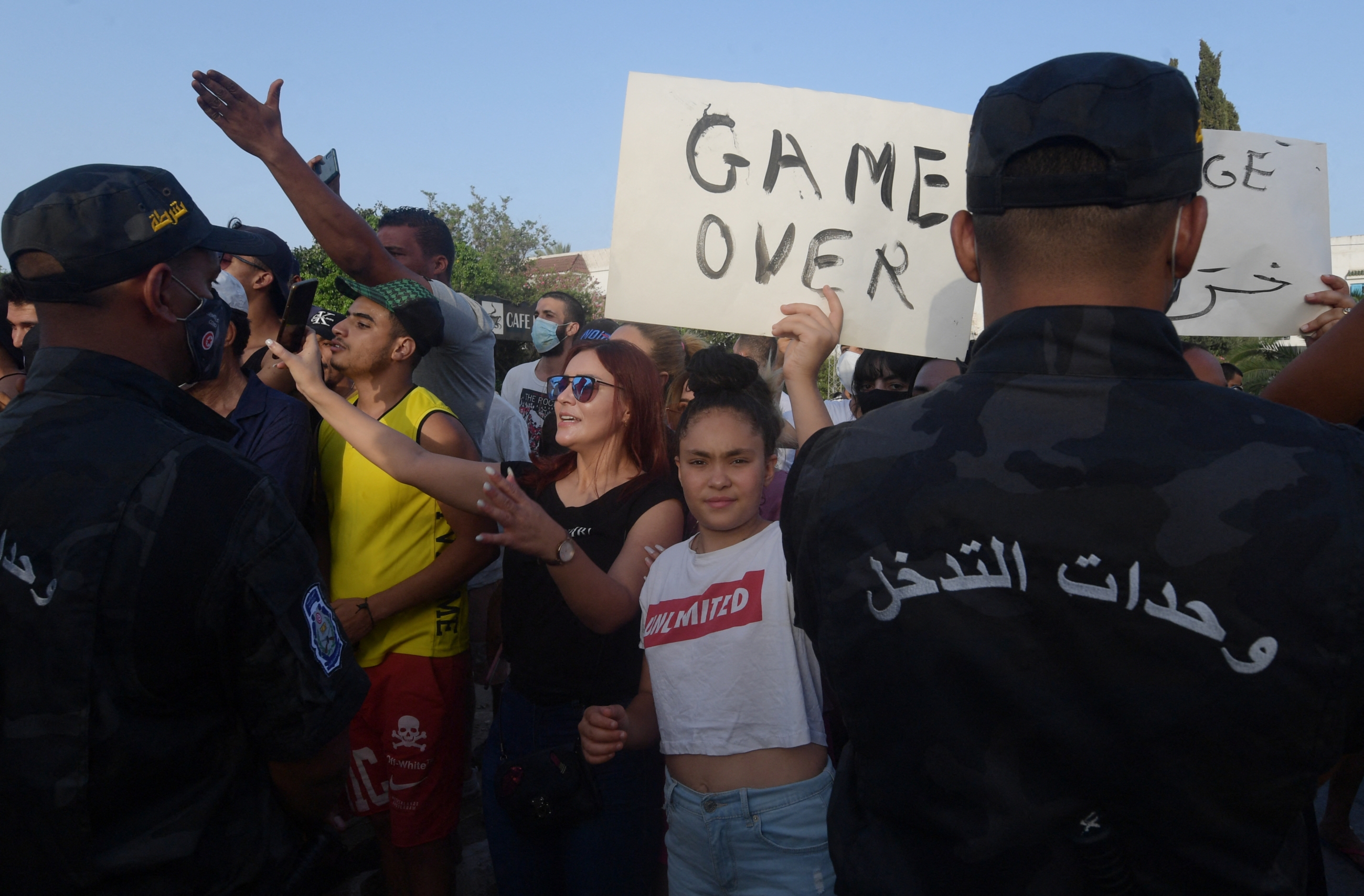
While many Tunisians are anxious that President Kais Saied's power grab could mean a step back for the nascent democracy, Tunisians who spoke to Middle East Eye on Friday expressed their hopes for the future.
Saied's dramatic decision on Sunday to sack the prime minister and freeze parliament was a move that observers say fundamentally contradicts Tunisia's constitution and could harm the country's democracy. But the mood on the capital's streets has been relatively calm - barring an initial clash between the president's supporters and opponents earlier in the week.
Al Jazeera's Tunis offices were stormed by police on Monday, while on Friday an independent MP was arrested and sentenced to two months of prison time for "participating in an act aimed at destroying the morale of the army". The arrest was based on a 2018 ruling and follows Saied's decision to remove parliamentarians' immunity.
Saied has since dismissed many employees in government administration and sacked the head of a national TV station.
But for many Tunisians, this week was business as usual and the beaches of Tunis have been filled with families swimming and building sandcastles.
Mounia, 55, and her daughter Maria, 17, who declined to give their family name, said they thought Saied had taken "a good step" for the country.
"As you can see, it is not a war zone here right now, we are not scared. Almost all the people are with him," said Mounia. "This happened because of some politicians' mistakes and people who stole from the country."
On Friday, MEE interviewed dozens of Tunisians from different age groups and districts at La Marsa beach - a waterside along one of Tunis' richest neighbourhoods.
The majority of those MEE spoke with were supportive of Saied's actions and felt optimistic about the future. Two families declined to comment, saying they did not wish to give their opinions.
Ghassen, 20, said that he was with Saied: "I didn't vote for anyone before, but I'll be voting for him next election. He has really impressed me. I'm with him."
Fathia Trabelsi, a woman in her fifties, said she was "very happy" about the decision, and wanted a stronger president to take decisions - rather than a fractured parliament.
"They have done nothing these last ten years. There is a lot of unemployment. Prices have risen. During the pandemic, they did nothing, they just left people to die."
Youssef, a 62-year-old, feels the problem is Tunisia's political deadlock:
"After we threw out Ben Ali, in order to avoid a situation where one man had a monopoly on power, we gave power to the parliament. But now, if there is no majority in parliament, it’s completely ungovernable. Everything is totally blocked."
Asked if he was worried about a potential return to dictatorship, he responded: "It's possible. It depends on the nature of the person. We have to hope that all will be well."
Radwan Masmoudi, a member of Ennahda's political committee, accepted some portion of the blame for the country's political and economic woes.
Tunisia has been governed by successive technocratic governments since early 2020, while Ennahda has held the majority of seats in parliament since the 2019 elections. The last time Ennahda led the government was in 2013.
"We are confident that real Tunisians want democracy to succeed. They may not be happy with Ennahda, we understand that we've made mistakes, there is no question that we have made mistakes. But we tried our best to keep democracy alive. We tried our best to defend the democratic process."
'By order of the president'
Following Tunisian President Kais Saied's request on Wednesday for business owners to lower their prices "for the sake of the country", some Tunisian businesses announced discounts and deals, posting on social media in support of the president under the hashtag #Article80.
The hashtag refers to the article of the constitution that Saied invoked late on Sunday when he abruptly fired Prime Minister Hichem Mechichi, froze parliament and assumed executive powers.
Saied's opponents and constitutional lawyers have called the power grab an illegitimate coup. Meanwhile, Saied insists his actions were lawful, sparked by the deteriorating economic and health crises facing Tunisia.
Since Sunday, Saied has made several pledges, including promises to fight corruption and retrieve 13.5 billion dinars ($4.8bn) he said was stolen from the country through fraud and unpaid taxes.
During the same meeting with the employers' federation, UTICA, Saied slammed the "bad economic choices" made in recent years, and asked traders and wholesalers to "lower prices" in a country where Tunisians' purchasing power has been greatly reduced as a result of inflation.
Following Saied's request, small businesses, wholesalers and cafes posted that they had reduced their prices "for the president".
La Piñata, a bar in the Gammarth suburb of Tunis, announced on its Facebook page that beers would cost 2.825 dinars ($1) - a reduction from between six and nine dinars - saying they had made the decision "for our dear Tunisia, for our dear President, and for our dear visitors".
Outside a cafe in Tunis' medina, a chalkboard read that all drinks would cost two dinars ($0.70). "Let the people live," read the sign.
According to local media reports, a private health clinic in Tunis also announced it would offer free operations, in line with Saied's request.
According to Tunisian political scientist Mohamed-Dhia Hammami, Saied's announcement was praised, as the business elites are unpopular in Tunisia and Tunisians have suffered economically.
Hammami added that Saied had to make a popular decision to show that he was "doing something", and give the impression he was keeping his word.
"We should be careful. Kais Saied is certainly popular, but we shouldn’t blindly trust anyone with unchecked powers," Hammami told MEE, following Sunday's events.
"The popular discontent with political parties and the dominant oligarchy is real, but it shouldn't be used to bring back old regime practices."
Middle East Eye propose une couverture et une analyse indépendantes et incomparables du Moyen-Orient, de l’Afrique du Nord et d’autres régions du monde. Pour en savoir plus sur la reprise de ce contenu et les frais qui s’appliquent, veuillez remplir ce formulaire [en anglais]. Pour en savoir plus sur MEE, cliquez ici [en anglais].


